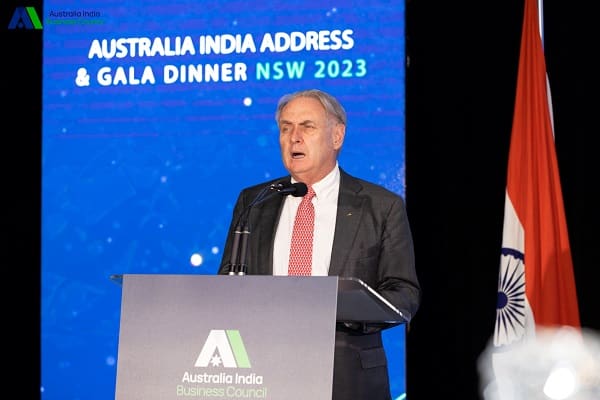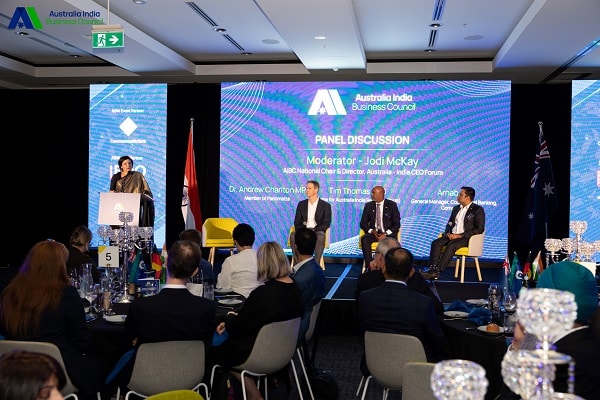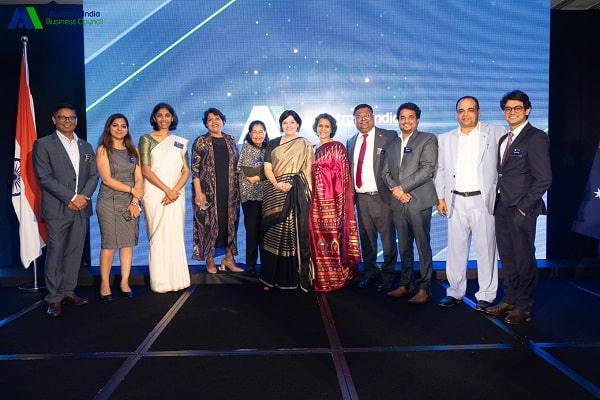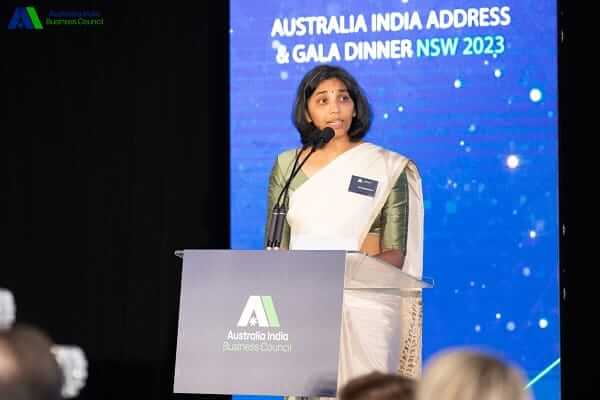A sense of urgency was palpable among the 250-plus attendees at the annual Australia India Business Council (AIBC) dinner, to move the trade activities between India and Australia forward.
Held for the first time in Parramatta, the attendees included corporates, business owners and leading community members keen to hear from Australian Trade Minister Don Farrell and his report card on the relationship, post-ECTA.
The India-Australia Economic Cooperation and Trade Agreement (IA-ECTA) was signed in April 2022 and came into effect in December 2022. This was Australia’s 17th free trade agreement and India’s 13th. Since then, bilateral relations have grown exponentially, with Australian PM Albanese leading a 25-strong business delegation of chief executives to encourage trade and investment in March this year; a return visit by PM Narendra Modi to Australia in May; high-level visits to each other’s countries by politicians of both countries; an uptick in defence cooperation, and the creation of a Centre for Australia-India Relations.
At the centre of the evolving relationship, is the burgeoning economic activity.
“ECTA has given us the fundamental architecture for putting in place formal strategies in the trade relationship,” Minister Don Farrell said. “It was not a simple process. But with the reduction in tariffs, $2.5 billion worth of Australian products went into the Indian market in recent months.

His own relationship with his Indian counterpart Piyush Goyal, the Minister revealed, has grown into a close friendship, following a series of meetings.
Besides direct trade, there has been progress in other areas, the Minister pointed out, such as in the registration of professionals through mutual agreement, and professional services accreditation.
Another speaker, the High Commissioner of India Manpreet Vohra, observed, “New supply chains are in my view the new frontier in this relationship. It’s a good time for trade – two-way trade has gone up from $34 billion to $48 billion, a 41% growth since ECTA was signed. Australia has realised it cannot rely on primary connections alone and must look elsewhere for value additions. India can help here. Come to India. Make in India Make for India. Make for Australia. Make for the world”.
In the panel discussion that followed, National Chair of the AIBC Jodi McKay probed the question that many are asking: We now have the framework, but is there genuine interest out there? Are we getting through – are we telling the story appropriately?

The three-panel members – Member of Parliament Dr Andrew Charlton, CEO of Centre for Australia India Relations Tim Thomas, and Commonwealth Bank‘s State General Manager, Business Banking Arnab Pal, answered her questions from the insights gained from their own business practice and/work in the India-Australia space.
Arnab Pal offered, “We are helping clients navigate the trade and financial banking arrangements, and are also seeing a rise in start-ups”.
The evolving nature of the relationship is also obvious, he noted. “Education ties for instance referred initially to international students coming here for further studies. Now it stands for India and Australia becoming trusted knowledge partners. There are some 450 research partnerships in operation, some of them quite sophisticated, such as the Australia-India Critical Minerals Research Hub.”
(This is a tie-up between Monash University, IIT Hyderabad and the International Centre for Excellence in Mining Safety and Automation (iCEM) in Gujarat, India, which will see Monash research and innovation applied to the mining and mineral development sector in India.)

Parramatta MP Andrew Charlton’s view was that the local diaspora must be engaged more than it is currently.
“They’ve given a lot, and they must now be supported as much as previous generations of migrants. For one thing, they are fabulously qualified, with 64% of them holding Bachelor’s degrees as opposed to 28% in the mainstream. And yet they are ten times more likely to not be in a job that requires that Bachelor’s degree. They are not making the contributions they could, and we must support them.”
Tim Thomas agreed, reiterating that the overarching purpose of CAIR is to transform the economic relationship underpinned by mutual understanding and people-to-people ties.
Charlton also stressed that Australian businesses must perhaps learn to treat India differently. “India is different from China, Singapore, Taiwan.”
McKay agreed that the need of the hour was to contemporise the relationship by increasing Australia’s India literacy.
News came in during the AIBC annual dinner that the Australian government had ratified the audiovisual co-production treaty with India, the agreement having been signed in March this year. This is set to encourage collaboration and creative exchange, leading to more Indian-Australian co-productions.
AIBC’s First Nations Roadmap
In a new initiative, AIBC launched its First Nations Roadmap, its program for building relationships and trade outcomes between First Australians and India-facing people and businesses.

Introducing it, NSW Committee Member Indu Balachandran said, “By engaging with the first traders of Australia, AIBC is committed to walk the talk, even more critical after the referendum”.
The roadmap was developed after a year-long series of consultations involving more than 150 stakeholders, including Indigenous businesses and peak bodies, government agencies, and businesses with a focus on India.
Co-authors Indu Balachandran and Susan Moylan Coombs stress the importance of understanding culture before embarking on business endeavours. Three key principles emerged from the consultations that will underpin AIBC’s work with First Nations people: Respect, Community-first, and Culture-centred.
It was heartening to see, for the first time at the AIBC annual dinner, First Nations businesses such as Koori Kulcha Experience, an Indigenous catering, education and cultural workshop specialist.
Photos: Vishaal Kumar / Evergreen Memories.
READ ALSO: RISE Accelerator to elevate Indian and Australian startups





